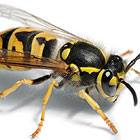SYMPTOMS OF A WASP OR BEE STING
Do you no what to look out for incase of a wasp or bee sting
During the summer months, wasp stings
are a real issue, this is because people are spending longer periods of time outside, enjoying the sun while it is out, which may only be for a few hours.
Wasp stings can be painful when they happen and then be uncomfortable over the next few days.
Wasps, bees and hornets
, are equipped with a stinger as a means of hunting or self-defense. A wasp’s stinger contains venom that’s injected during a sting. a wasp can sting more than once during an attack. Wasp stingers remain intact, as a wasp can sting more than once during an attack.
While a bee can only sting once because its stinger becomes stuck in the skin of its victim, and should never just be pulled out or you will squeeze more venom into the skin, instead use a credit card and brush the stinger off the skin.
Symptoms of a wasp sting
The initial sensations can include sharp pain or burning at the site of the sting. Causing redness, swelling, and then itching which can follow as well.
Normal local reactions
You’re likely to develop a raised bump around the sting site. A tiny white mark may be visible in the middle of the bump, this is where the stinger punctured your skin. Usually, the pain and swelling goes down within hours of being stung.
Large local reactions
A Large reaction is a term used to describe more pronounced symptoms associated with a wasp or bee sting. People who have large reaction may be allergic to wasp stings, but don’t experience life-threatening symptoms, such as anaphylactic shock. A Large reaction to a wasp stings will include extreme redness and swelling that may increase for two or three days after the sting.
Most of the time, large reactions subside on their own over the course of a week or so. Let your doctor know if you have a large local reaction to a wasp sting. They may direct you to take an over-the-counter antihistamine medication to reduce your discomfort.
Having a large reaction after a wasp sting one time doesn’t necessarily mean you will react to future stings in the same way. You could have one strong reaction and never show the same symptoms again. On the other hand, a large local reaction could be the way your body routinely responds to wasp stings. Try to avoid being stung to prevent these uncomfortable symptoms.
ANAPHYLAXIS
Anaphylaxis following a wasp sting
The most severe allergic reactions to wasp stings are referred to as anaphylaxis. Anaphylaxis occurs when your body goes into shock in response to the wasp venom. Most people who go into shock after a wasp sting do so very quickly. It’s important to seek immediate emergency care to treat anaphylaxis.
Symptoms of a severe allergic reaction to wasp stings include:
severe swelling of the face, lips, or throat
hives or itching in areas of the body not affected by the sting
breathing difficulties, such as wheezing or gasping
dizziness
the sudden drop in blood pressure
lightheadedness
loss of consciousness
nausea or vomiting
diarrhea
stomach cramps
weak or racing pulse
You may not experience all of these symptoms after a wasp sting, but you’re likely to experience at least some of them after a subsequent sting. It is said that people who have gone into anaphylactic shock after one sting are 30 to 60 percent more likely to show the same reaction in the future.
If you have a history of anaphylaxis, you may be given an Epi-Pen so that you can give yourself after a wasp sting. Epinephrine relaxes your muscles and blood vessels, helping your heart and respiration rates return to normal.
Severe reactions
Severe allergic reactions to wasp stings require immediate medical attention. If you have an Epi-Pen, administer it as soon as symptoms begin. If you have a history of wasp allergies, administer the Epi-Pen as soon as you are stung. Then call 999 straight away.
Treatment for severe allergic reactions to wasp stings can include:
additional epinephrine to calm your immune system
cardiopulmonary resuscitation (CPR) if breathing has temporarily stopped
oxygen, steroids, or other medications to improve breathing.
All Rights Reserved Shire Pest Solutions

